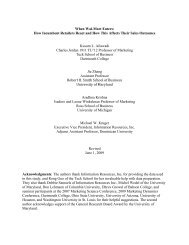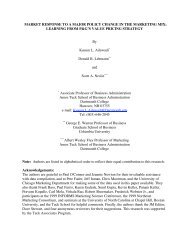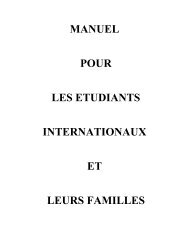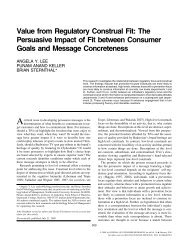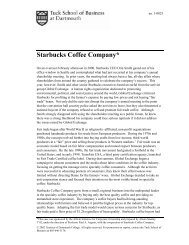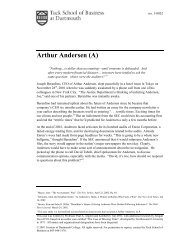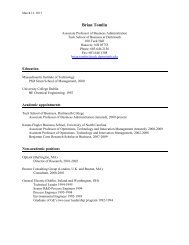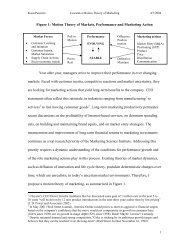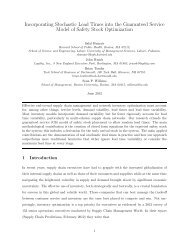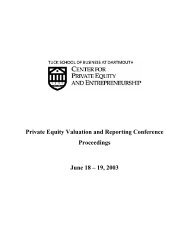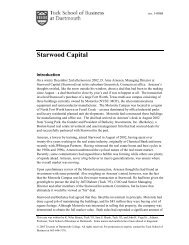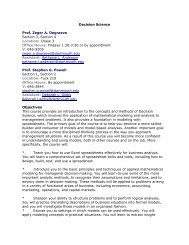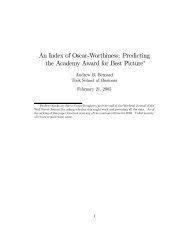tax notes international - Tuck School of Business - Dartmouth College
tax notes international - Tuck School of Business - Dartmouth College
tax notes international - Tuck School of Business - Dartmouth College
Create successful ePaper yourself
Turn your PDF publications into a flip-book with our unique Google optimized e-Paper software.
OECD<br />
OECD<br />
OECD Group Addresses CIVs,<br />
Cross-Border Investors<br />
An informal consultative group (ICG) organized by<br />
the OECD has released two reports that address the<br />
application <strong>of</strong> treaty benefits to collective investment<br />
vehicles and cross-border investors<br />
Issued on January 12, the reports — ‘‘Granting <strong>of</strong><br />
Treaty Benefits With Respect to the Income <strong>of</strong> Collective<br />
Investment Vehicles’’ (the CIV report) and ‘‘Possible<br />
Improvements to Procedures for Tax Relief for<br />
Cross-Border Investor’’ (the procedures report) — were<br />
commissioned by the OECD in December 2006 when<br />
the informal consultative group was established.<br />
The CIV report deals with conceptual and practical<br />
issues relating to income <strong>tax</strong> treaty benefits when investors<br />
in one country invest, through a fund organized in<br />
a second country, in investments in a third country.<br />
The procedures report deals more generally with the<br />
practical problems <strong>of</strong> making claims for treaty relief<br />
when investors hold investments through intermediary<br />
institutions, such as banks and brokerages, and are not<br />
the owners <strong>of</strong> record <strong>of</strong> the investments.<br />
Fund managers with cross-border investments or<br />
investors, banks, and brokerages should be aware <strong>of</strong><br />
this development, since it might be a harbinger <strong>of</strong> future<br />
developments in <strong>international</strong> <strong>tax</strong> treaty practice.<br />
It must be emphasized that at this stage, the reports<br />
contain only the views <strong>of</strong> the ICG. The OECD’s Committee<br />
for Fiscal Affairs has not adopted the ICG’s<br />
conclusions as a statement <strong>of</strong> the OECD’s <strong>of</strong>ficial<br />
views, although it may do so in the future.<br />
The CIV Report<br />
It is very common for an investment fund organized<br />
in one country (the fund country) owned by investors<br />
in a second country (the investor country) to invest in<br />
securities issued by residents <strong>of</strong> a third country (the<br />
source country). Most source countries impose withholding<br />
<strong>tax</strong>es on payments <strong>of</strong> interest, dividends, or<br />
both to foreign investors, and some (such as Canada,<br />
Spain, and Australia) impose <strong>tax</strong> on some capital gains<br />
realized by foreign investors.<br />
Thus, investors are <strong>of</strong>ten very interested in whether<br />
relief from source-country <strong>tax</strong> is available under an<br />
applicable income <strong>tax</strong> treaty. There may be a treaty<br />
between the source country and the fund country, a<br />
treaty between the source country and the investor<br />
country, or both. Unfortunately, even if the source<br />
country has <strong>tax</strong> treaties with both the fund country and<br />
the investor country, it is <strong>of</strong>ten very difficult for investments<br />
made by such a fund to qualify for benefits un-<br />
der either treaty. There are conceptual and practical<br />
reasons for this. (The practical reasons are discussed in<br />
the procedures report.)<br />
Source-Country/Fund-Country Treaty<br />
A fund typically will be able to claim treaty benefits<br />
in its own right under the source-country/fund-country<br />
treaty only if it is a resident <strong>of</strong> the treaty country. Article<br />
4(1) <strong>of</strong> the 2008 OECD model income <strong>tax</strong> treaty<br />
defines a resident <strong>of</strong> a treaty country as ‘‘any person<br />
who, under the laws <strong>of</strong> that State, is liable to <strong>tax</strong><br />
therein by reason <strong>of</strong> his domicile, residence, place <strong>of</strong><br />
management or any other criterion <strong>of</strong> a similar nature.’’<br />
There are three common reasons why a source<br />
country might not treat a fund as a resident <strong>of</strong> the<br />
fund country for treaty purposes, thereby denying<br />
treaty benefits.<br />
First, the source country might not view the fund as<br />
a ‘‘person’’ for treaty purposes. Some types <strong>of</strong> vehicles<br />
commonly used for investment funds are treated as<br />
contractual relationships, and not legal entities, as a<br />
matter <strong>of</strong> domestic law. One very common example is<br />
the Luxembourg fond commun de placement (mutual<br />
fund). Also, funds organized as trusts create problems<br />
because the concept <strong>of</strong> a trust frequently does not exist<br />
under the laws <strong>of</strong> non-English-speaking countries.<br />
Second, a fund most likely is not subject to <strong>tax</strong> in<br />
the fund country at the full statutory rate. It might be<br />
exempt from <strong>tax</strong> or <strong>tax</strong>able at a special low rate, it<br />
might be fiscally transparent, or it might get a deduction<br />
for dividends paid (like U.S. mutual funds <strong>of</strong> the<br />
usual type). The source country might not view such a<br />
fund as subject to <strong>tax</strong> in the fund country.<br />
The view <strong>of</strong> the United States is that an entity is<br />
subject to <strong>tax</strong> in the fund country if the fund country<br />
has <strong>tax</strong>ing jurisdiction over the entity, so under general<br />
principles <strong>of</strong> fund-country law, the entity could be subject<br />
to fund-country <strong>tax</strong>, even if the entity is subject to<br />
a special <strong>tax</strong> exemption. Other countries are not as lenient.<br />
Third, although limitation on benefits clauses historically<br />
were unique to U.S. income <strong>tax</strong> treaties, sometimes<br />
a source country will want some assurance that<br />
the fund is not being misused by investors resident in<br />
countries that do not have an income <strong>tax</strong> treaty with<br />
the source country. There are several situations in<br />
which a source country will not grant treaty relief to a<br />
fund without knowing something about who owns the<br />
fund.<br />
Source-Country/Investor-Country Treaty<br />
The problem with a claim by an investor for relief<br />
under the source-country/investor-country treaty is that<br />
the fund is in the middle. Treaties based on the OECD<br />
model provide relief to a beneficial owner <strong>of</strong> income.<br />
But the OECD model treaty does not purport to define<br />
what a beneficial owner is, and this issue is the subject<br />
<strong>of</strong> much debate.<br />
402 • FEBRUARY 2, 2009 TAX NOTES INTERNATIONAL<br />
(C) Tax Analysts 2009. All rights reserved. Tax Analysts does not claim copyright in any public domain or third party content.



